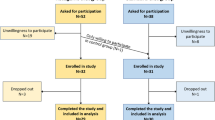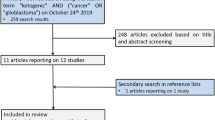Abstract
Purpose
Whereas vismodegib is effective in the treatment of locally advanced/metastatic basal cell carcinoma, dysgeusia and weight loss are common side effects of such treatment. The main objective of this study was to monitor the nutritional status of vismodegib-treated patients. Secondary objective was to assess the incidence of dysgeusia and the benefit of early nutritional management.
Methods
This prospective study included all patients who started vismodegib between October 2011 and May 2013 at Nantes University Hospital. Prior to July 2012, patients treated with vismodegib had not received any specific nutritional management (Historical cohort). Body weight and presence of dysgeusia were recorded monthly. Patients treated after July 2012 (Nutrition cohort) were evaluated by a physician of the Nutrition Support Unit and received dietary counseling at vismodegib initiation. A standardized nutritional management protocol was initiated in case of significant weight loss.
Results
Forty-five patients (21 and 24 in the Nutrition and Historical cohort, respectively) were enrolled. In the Nutrition cohort, five patients (24 %) were undernourished at vismodegib initiation, and the 6-month cumulative incidence of dysgeusia was 71 %. Eight patients (38 %) and 13 patients (54 %) had a weight loss greater than 5 % in the Nutrition and Historical cohort, respectively (p = 0.3727).
Conclusion
The results of this pilot study suggest the benefit of early nutritional screening. The potential benefit of nutritional support in this setting warrants further investigation.




Similar content being viewed by others
References
Xie J, Murone M, Luoh SM et al (1998) Activating smoothened mutations in sporadic basal-cell carcinoma. Nature 391:90–92. doi:10.1038/34201
Sekulic A, Migden MR, Oro AE et al (2012) Efficacy and safety of vismodegib in advanced basal-cell carcinoma. N Engl J Med 366:2171–2179. doi:10.1056/NEJMoa1113713
Tang JY, Mackay-Wiggan JM, Aszterbaum M et al (2012) Inhibiting the Hedgehog pathway in patients with the basal-cell nevus syndrome. N Engl J Med 366:2180–2188. doi:10.1056/NEJMoa1113538
Chang ALS, Solomon JA, Hainsworth JD et al (2014) Expanded access study of patients with advanced basal cell carcinoma treated with the Hedgehog pathway inhibitor, vismodegib. J Am Acad Dermatol 70:60–69. doi:10.1016/j.jaad.2013.09.012
Basset-Seguin N, Hauschild A, Grob J-J et al (2015) Vismodegib in patients with advanced basal cell carcinoma (STEVIE): a pre-planned interim analysis of an international, open-label trial. Lancet Oncol. doi:10.1016/S1470-2045(15)70198-1
Baker JP, Detsky AS, Wesson DE et al (1982) Nutritional assessment: a comparison of clinical judgement and objective measurements. N Engl J Med 306:969–972. doi:10.1056/NEJM198204223061606
Guigoz Y, Vellas BJ (1997) Malnutrition in the elderly: the Mini Nutritional Assessment (MNA). Ther Umsch Rev Thérapeutique 54:345–350
Thibault R, Goujon N, Le Gallic E et al (2009) Use of 10-point analogue scales to estimate dietary intake: a prospective study in patients nutritionally at-risk. Clin Nutr 28:134–140. doi:10.1016/j.clnu.2009.01.003
Chren M-M (2012) The Skindex instruments to measure the effects of skin disease on quality of life. Dermatol Clin 30:231–236. doi:10.1016/j.det.2011.11.003
Aaronson NK, Ahmedzai S, Bergman B et al (1993) The European Organization for Research and Treatment of Cancer QLQ-C30: a quality-of-life instrument for use in international clinical trials in oncology. J Natl Cancer Inst 85:365–376
National Cancer Institute. Common terminology criteria for adverse events v4.0, NCI, NIH, DHHS. May 29, 2009. NIH publication # 09-7473
Schroll M, Jørgensen L, Osler M, Davidsen M (1993) Chronic undernutrition and the aged. Proc Nutr Soc 52:29–37
Abbasi AA, Rudman D (1994) Undernutrition in the nursing home: prevalence, consequences, causes and prevention. Nutr Rev 52:113–122
Sánchez-Lara K, Sosa-Sánchez R, Green-Renner D et al (2010) Influence of taste disorders on dietary behaviors in cancer patients under chemotherapy. Nutr J 9:15. doi:10.1186/1475-2891-9-15
Yang H, Cong W-N, Yoon JS, Egan JM (2015) Vismodegib, an antagonist of Hedgehog signaling, directly alters taste molecular signaling in taste buds. Cancer Med 4:245–252. doi:10.1002/cam4.350
Berteretche MV, Dalix AM, d’ Ornano AMC et al (2004) Decreased taste sensitivity in cancer patients under chemotherapy. Support Care Cancer 12:571–576. doi:10.1007/s00520-004-0589-2
Heckmann SM, Hujoel P, Habiger S et al (2005) Zinc gluconate in the treatment of dysgeusia—a randomized clinical trial. J Dent Res 84:35–38
Najafizade N, Hemati S, Gookizade A et al (2013) Preventive effects of zinc sulfate on taste alterations in patients under irradiation for head and neck cancers: a randomized placebo-controlled trial. J Res Med Sci 18:123–126
Hovan AJ, Williams PM, Stevenson-Moore P et al (2010) A systematic review of dysgeusia induced by cancer therapies. Support Care Cancer 18:1081–1087. doi:10.1007/s00520-010-0902-1
Tupe RP, Chiplonkar SA (2009) Zinc supplementation improved cognitive performance and taste acuity in Indian adolescent girls. J Am Coll Nutr 28:388–396
Stewart-Knox BJ, Simpson EEA, Parr H et al (2008) Taste acuity in response to zinc supplementation in older Europeans. Br J Nutr 99:129–136. doi:10.1017/S0007114507781485
Dummer R Basset-Seguin N, Hansson J, et al. Impact of treatment breaks on vismodegib patient outcomes: exploratory analysis of the STEVIE study. 2015 ASCO Annual Meeting. http://meetinglibrary.asco.org/content/144375-156. Accessed 28 Jul 2015.
Acknowledgments
The authors thank the Dietary Service and the dieticians who took part in this study.
Compliance with ethical standards
ᅟ
Disclosure
The authors have declared no conflicts of interest.
Funding sources
None.
Ethical approval
All procedures performed in studies involving human participants were in accordance with the ethical standards of the institutional and/or national research committee and with the 1964 Helsinki declaration and its later amendments or comparable ethical standards.
Informed consent
Informed consent was obtained from all individual participants included in the study.
Author information
Authors and Affiliations
Corresponding author
Additional information
Marie Le Moigne, Mélanie Saint-Jean, and Adam Jirka shared first authorship.
Rights and permissions
About this article
Cite this article
Le Moigne, M., Saint-Jean, M., Jirka, A. et al. Dysgeusia and weight loss under treatment with vismodegib: benefit of nutritional management. Support Care Cancer 24, 1689–1695 (2016). https://doi.org/10.1007/s00520-015-2932-1
Received:
Accepted:
Published:
Issue Date:
DOI: https://doi.org/10.1007/s00520-015-2932-1




